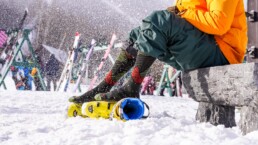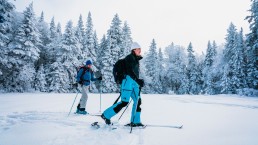Are you planning to take part in triathlon competitions (sprint, Olympic, 70.3)? You probably already suspect that nutrition is a key factor in your training progress and your performance on race day. Here are a few important points to keep in mind:
By Ariane Lavigne, Dt.P., IOC dipl. Sports Nutritionist, 2014 Olympian

Glycogen Loading
- 36–48 hours before the race (mainly for Olympic and 70.3 distances), increase your carbohydrate intake (the primary fuel used by muscles during exertion), while reducing sources of protein and lipids.
Aim for at least 5–7 grams of carbohydrates per kg of body weight per day, which equals about 400–500 grams for a 70 kg person. - 2 to 3 hours before the race, have a small breakfast and drinks that are also high in carbohydrates, to reach 2–3 grams of carbs per kg of body weight (which equals 140–210 grams of carbs for someone weighing 70 kg). Avoid foods high in protein and fat, which are harder to absorb and digest.
Hydration
- In the 2 hours before the race, drink more than 500 ml of fluids.
- Drink as soon as you exit the swim, and plan for about 500 ml (1 bottle) of fluids per hour on the bike (adjust based on weather conditions and how much you sweat). For the run, try to drink regularly—3–4 sips every 15 minutes, if possible.
- Choose drinks with electrolytes, and make sure you’re getting at least 300 mg of sodium per liter of fluid.
Energy Sources During the Event
- In triathlon, the bike portion is the ideal time to maintain your energy levels. Aim for at least 45 grams of carbohydrates per hour.
- For a 70.3 race, you can consume up to 90 grams of carbs per hour on the bike, if tested in training (by varying your carbohydrate sources, e.g., fructose and maltodextrin) and include, in small portions, some solid foods containing a bit of protein and fat (e.g., energy bar, peanut butter sandwich, trail mix with dried fruits and nuts). Be sure to practice this during training so your digestive system gets used to it.
Example Triathlete Menu
Day Before the Race
Here is an example for a glycogen load of about 500 grams of carbohydrates per day.
- Dinner – 6 p.m. (Approx. 140 grams of carbs)
- 2 cups of pasta with tomato sauce (100 grams of carbohydrates)
- 1/2 cup of plain yogurt with 1 tbsp (15 ml) of maple syrup (20 grams of carbohydrates)
- 1 glass of juice (20 g)
- Snack – 9 p.m. (Approx. 40 grams of carbs)
- 1 small homemade muffin and 1 banana
Before the Race
Aim for 2 to 3 grams of carbs per kg of body weight.
- Breakfast – 5am: 120 grams of carbohydrates
- 1 cup of applesauce (30 g carbs)
- 1 cup of cooked oatmeal with 1 tbsp maple syrup (35 g carbs)
- 2 tbsp raisins (15 g carbs)
- 250 ml juice (30 g carbs)
- Snack – 30 minutes before race start: 30-60 grams of carbohydrates
- 1 gel with 500ml of water and/or a bottle of sports drink
During the Race
Aim for an intake of approximately 45-90 grams of carbohydrates per hour. Aim for a snack of at least 60 grams of carbohydrates; 15-20 grams of protein, and a meal within a few hours.
- On the bike: 1 sports drink bottle with carbohydrates and sodium per hour + 1 gel or gummies per hour and 1 bar divided over the hours.
- On the run: sports drink/electrolytes and water at each station + 1 gel or gummies per hour.
After the Race
Aim for a snack of at least 60 grams of carbohydrates, 15-20 grams of protein, and a meal within a few hours.
- 500 ml of chocolate milk and a banana.
Remember: there’s no magic formula. You need to test different drinks and foods during your training to adjust the types and quantities based on your preferences, your individual tolerance, the weather, and the intensity of your effort.
Dig deeper: Training in Tremblant: A Triathletes Paradise
For individual consultations by videoconference or in person at the Clinique Mouvement Optimal Tremblant, write to info@vivai.ca








